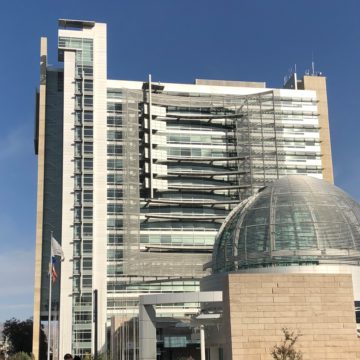San Jose officials have a daunting task of balancing the budget as they attempt to preserve city services with a $52.1 million shortfall.
The San Jose City Council unanimously approved Mayor Matt Mahan’s March budget message on Tuesday, but not before numerous councilmembers added their own amendments around housing, homelessness and other city services. Over the next few months, councilmembers, city workers and residents will engage in meetings to determine the final budget. The city manager will release a detailed budget, outlining the costs in May. The final budget will be adopted June 18.
Councilmembers Peter Ortiz, Domingo Candelas and Sergio Jimenez asked the city manager to find ways to increase park funding, expand the non-law-enforcement TRUST program, which operates a mental health mobile field team, and ensure dollars are saved for affordable housing development.
They also asked for analysis of the long-term effect of the various potential housing plants, including the mayor’s plan to once again shift Measure E dollars toward temporary housing. Measure E is a property transfer tax approved by voters in 2020 that applies to property transfers of $2 million or more.
Ortiz, Candelas and Jimenez want to ensure enough dollars are saved for affordable housing development.
“It’s not a matter of either or, but rather a ‘yes and’ approach,” Candelas said. “While we understand the difficult decisions that lie ahead, given the deficit, I want to urge keeping both, ending homelessness and increasing the availability of affordable housing as top priorities.”
A similar Measure E proposal by Mahan last year was met with fierce opposition, and the council settled on a spending plan that favored affordable housing development, instead of temporary homeless housing.
Mahan may have more success this year shifting those dollars in favor of temporary housing development. He appears to have a stronger base and may be able to sway more support because of a potential November regional housing measure that would unlock more funding for affordable and permanent supportive housing.
Councilmember David Cohen said because the city has committed to building out more temporary homeless housing, the city must find a way to cover the costs — and Measure E is a possible solution.
Ortiz, Candelas and Jimenez also proposed eliminating “redundant or unessential positions” in the mayor’s office, as a cost-cutting measure.
Councilmember Dev Davis made a motion to not include that as part of the city’s budget and called it “inappropriate.”
“It’s really important that we as a council frankly, refrain from any potshots at each other,” Davis said at the meeting. “At the same time, I know where this came from. I think it’s indicative of the state of the relationships on this council, some with each other and also with the mayor, and it’s not good.”
Vice Mayor Rosemary Kamei asked the mayor to adjust his message, and include direction to outlaw “vanlords” — people who rent usually broken down RVs to homeless residents.
She also touted the mayor’s children and youth master plan, which aims to provide marginalized children opportunities to a myriad of services to meet their needs and explore college and career pathways. This pilot program would specifically focus on youth in Poco Way/Mayfair and Seven Trees/Santee communities, and fund workers at both the Starbird and Berryessa Youth centers.
Councilmember Omar Torres said while he is proud of the programs to support small businesses and clean blight, he hopes to see more funding for prevention services for the city’s most disenfranchised youth, particularly in the East San Jose.
While several councilmembers want to do more, the city will be forced to scale back because of the $52.1 million shortfall.
Key sources of city funding such as sales and property taxes are projected to trend down over the next five years, and the city will have higher operating costs because of raises given to union workers last year. San Jose will also have to dish out $25 million to clear out the estimated 1,000 homeless people from encampments along creeks and rivers by June in response to a mandate by the San Francisco Bay Regional Water Quality Control Board. If the city fails to do so, it could face litigation and $60,000 in daily fines per pollutant.
There are several programs funded over the past few years on a one-time basis that no longer have funding, including several BeautifySJ pilot programs and the San Jose Police Department sworn backfill reserve program. Maintaining all these programs will cost $23.5 million the city does not have, forcing either a reduction in services or cuts elsewhere.
“This year…we have a tougher job ahead of us,” Mahan said. “We know there are many, many needs in our community (and we’ve tried to draft a budget) in a way that enables us to continue to provide critical city services, while still making progress in the council’s adopted focus areas.”





